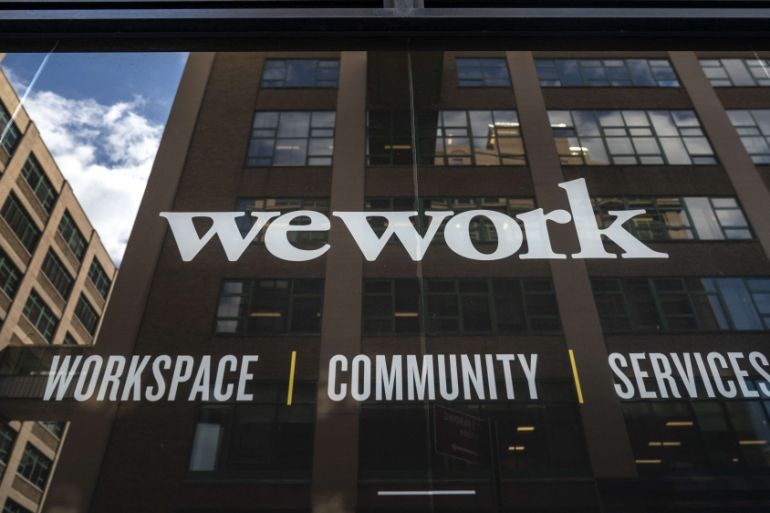IPO postponed: WeWork is not going public, for now
The We Company decided to focus on ‘core business’ rather than jumping onto the stock market amid investor scepticism.

WeWork’s parent The We Company said on Monday that it is filing to withdraw its initial public offering (IPO), a week after the SoftBank-backed office-sharing startup ousted founder Adam Neumann as its chief executive officer.
The withdrawal of its IPO prospectus formalises the end of the pursuit of a near-term listing for the company, which is based in New York City. It also allows Neumann’s successors to proceed with the company’s financial turnaround without disclosing as much information publicly.
Keep reading
list of 4 itemsAs US inflation ticks back up, it could impact the presidential election
Will the US unemployment rate continue at historic lows?
The UK’s new minimum wage ‘badly needed’ but many calling for more
The decision to abandon the IPO marks the conclusion of a tumultuous few weeks for the United States office-sharing firm, which failed to excite investors – who raised concerns about its burgeoning losses and a business model that involves taking long-term leases and customers renting out spaces for shorter periods.
Furthermore, experts pointed out that removing Neumann from the CEO role and addressing governance issues was not enough, and that such a business model was unlikely to thrive during an economic downturn.
According to the IPO prospectus it filed earlier in September, We Company had cash and cash equivalents of roughly $2.5bn as of June 30. However, while the company’s revenue doubled to nearly $1.8bn in 2018, its losses also more than doubled to $1.9bn.
The decision to scrap the public share sale will also put pressure on WeWork to secure alternative funding, given that a $6bn loan deal with banks – agreed last month – hinged on a successful share sale of at least $3bn.
Analysts have projected that WeWork will burn through several billion dollars over the next few years and thus needs to keep on raising fresh funds at favourable valuations.
Fundamentals ‘remain strong’
According to two sources familiar with the matter, the company is currently looking to trim its workforce and slow down its expansion in order to burn through less cash and be less dependent on fresh funding.
Meanwhile, the company is in talks to raise new funds from investors, including SoftBank Group Corp, the sources told the Reuters news agency.
SoftBank, which had been pushing WeWork to postpone its IPO and is currently attempting to raise its second Vision Fund worth at least $100bn, is under pressure to assuage key backers of the fund who have raised concerns over the long-term viability of the investment fund.
The decision to withdraw the IPO was no surprise, though. It was widely expected after the company postponed the share sale earlier in September, following pushback from prospective stock market investors over its widening losses and Neumann’s unusually firm grip on the company.
“We have decided to postpone our IPO to focus on our core business, the fundamentals of which remain strong,” Artie Minson and Sebastian Gunningham, WeWork’s newly appointed co-CEOs, said on Monday.
“We have every intention to operate WeWork as a public company and look forward to revisiting the public equity markets in the future,” they added.
SoftBank, which owns nearly a third of We Company, invested in the startup at a $47bn valuation in January. But investor scepticism led to it earlier this month considering a potential IPO valuation of as low as $10bn.
We Company had vowed to pursue the IPO and complete the share sale by the end of the year after Neumann stepped down as CEO.
WeWork’s withdrawn IPO marks a rough period for startups that have been going public in recent weeks. Last week, US entertainment and talent agency company Endeavor Group Holdings pulled its IPO, while shares of Peloton Interactive Inc, the fitness startup known for on-demand workout programmes on its exercise bikes, slid as much as seven percent in its market debut.
Earlier in September, teeth alignment firm SmileDirectClub Inc opened to an underwhelming debut.
Ride-hailing companies Uber Technologies Inc and Lyft Inc also went public earlier this year with high expectations, but their shares have tumbled since then – with investors concerned over their steep losses.